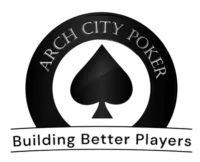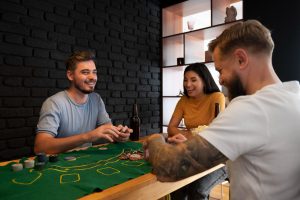Why Away-From-Table Work Matters
Playing poker provides experience but doesn’t automatically generate improvement. Many players grind thousands of hands without getting better because they never analyze their play or study strategy away from the tables. Real growth happens when you combine playing with dedicated study time.
The fast pace of live and online play prevents deep analysis during hands. You must make decisions quickly, leaving little time for thorough thinking. Away from the tables, you can analyze situations carefully, considering factors you missed during actual play.
Repeating the same mistakes becomes habitual without review. When you make an error during play and never examine it, you’ll likely repeat that mistake hundreds of times. Off-table study breaks this cycle by identifying errors and establishing better patterns.
Hand History Review
Analyzing hands you’ve played reveals mistakes invisible during the heat of action. When money is on the line and decisions come fast, you miss alternative lines that become obvious during calm review. This hindsight provides valuable learning opportunities.
Focus review on hands where you felt uncertain or made significant decisions. These spots mean learning opportunities because uncertainty indicates knowledge gaps. Knowing why you struggled helps you handle similar situations better in the future.
Write notes about hands before analyzing them. Record what you were thinking during the hand, why you made each decision, and what questions you have. This documentation captures your real-time thought process for comparison with your later analysis.
Systematic Strategy Study
Structured learning from instructional content builds strategic foundations that playing alone cannot provide. Books, videos, and courses teach concepts you might never discover through experience. This outside knowledge accelerates your development dramatically.
Different instructional formats serve different learning purposes. Videos show concepts in action, books allow careful reading and re-reading of complicated topics, and courses provide structured progression through material. Using multiple formats reinforces learning.
Take notes while studying to improve retention. Writing down key concepts forces you to process information actively rather than passively absorbing it. These notes become valuable references for future review.
Equity Calculations & Math Work
Poker math becomes intuitive through practice away from the tables. Calculate pot odds, equity, and expected value for common situations until the math becomes automatic. This fluency allows you to make mathematically sound decisions quickly during play.
Use equity calculators to run scenarios you encounter frequently. Knowing how different hand types perform against various ranges builds intuition for which draws to chase and which made hands to value.
Practice mental math for common calculations. Being able to quickly estimate pot odds or determine bet sizes as percentages of the pot speeds up your decision-making and reduces errors.
Range Construction Exercises
Building ranges for different positions and situations sharpens your preflop game. Work through which hands to open from each position, how to construct three-betting ranges, and when to defend your blinds. This preparation creates clarity that prevents mistakes during play.
Analyze how ranges interact with different board textures. Knowing which flops favor raising ranges versus calling ranges helps you make better decisions about when to bet, check, or fold.
Consider how opponent types affect your range construction. Adjust your ranges based on if opponents play tight or loose, passive or aggressive. This adaptability improves your results against different player styles.
Mental Game Work
Emotional control requires attention and practice just like technical skills. Identify your tilt triggers, develop coping strategies, and work on maintaining composure during frustrating situations. This psychological preparation prevents costly mistakes during play.
Meditation and mindfulness practices improve focus and emotional regulation. Even brief daily practice can significantly affect your mental game. These skills transfer directly to better performance at the tables.
Visualization exercises prepare you for difficult situations. Imagine handling bad beats calmly, making tough folds correctly, and maintaining discipline during downswings. Mental rehearsal makes these responses more natural when situations occur.
Goal Setting & Planning
Clear objectives guide your improvement efforts productively. Set specific, measurable goals for both results and process improvements. Having targets motivates consistent work and allows you to track progress.
Break large goals into smaller milestones. Rather than focusing only on distant objectives like beating higher stakes, create intermediate targets like mastering specific concepts or reaching certain hand volumes. These smaller wins maintain motivation.
Review goals regularly to assess progress and adjust plans. What you thought you needed to work on might change as you improve. Flexible planning adapts to your actual development rather than rigidly following outdated objectives.
Learning From Other Players
Watching strong players provides insights into different strategic approaches. Observe how they construct ranges, size bets, and handle various situations. Exposure to multiple perspectives expands your strategic toolkit.
Discussion with other improving players accelerates learning through shared knowledge. When you talk through hands or debate strategy, you clarify your own thinking and learn from others’ perspectives.
Study groups create accountability and structure for your improvement work. Regular meetings ensure consistent study habits and provide forums for discussing difficult concepts with peers at similar skill levels.
Database Analysis
Tracking software reveals patterns in your play that aren’t obvious during individual sessions. Statistical analysis shows which situations profit and which lose money, identifying specific areas needing improvement.
Review key statistics regularly to ensure they fall within optimal ranges. Compare your numbers to benchmarks for winning players at your stake. Large deviations indicate leaks requiring attention.
Filter your database to study specific situations. Look at your results in three-bet pots, from different positions, or on particular board textures. This granular analysis pinpoints exactly where you make or lose money.
Scenario Practice
Work through common situations systematically to develop automatic responses. Practice bet sizing decisions, hand reading exercises, and strategic choices until correct plays become instinctive.
Create hypothetical hands and analyze them thoroughly. Consider board texture, positions, stack sizes, and opponent types. Working through many scenarios builds pattern recognition that speeds decisions during actual play.
Time yourself on decision-making exercises to simulate game conditions. Practicing quick analysis helps you think clearly under the time pressure of real poker.
Reading & Research
Books on poker strategy provide deep dives into concepts that videos and articles only cover superficially. The detailed treatment of topics in books allows for nuanced knowledge which is impossible in shorter formats.
Follow poker strategy forums and discussion boards to stay current with evolving concepts. The poker community constantly develops new ideas, and staying connected keeps your knowledge fresh.
Read beyond just poker strategy. Books on decision-making, psychology, probability, and game theory provide frameworks that apply to poker. This broader reading deepens your analytical abilities.
Taking Breaks to Process
Your brain needs time to consolidate learning. After intense study sessions, take breaks before playing to let concepts settle. This processing time improves retention and makes new knowledge more accessible during play.
Sleep plays a huge role in learning consolidation. Studying before bed allows your brain to process information overnight. Many players find concepts click after sleeping on them.
Varying study activities prevents mental fatigue. Switch between watching videos, reviewing hands, and doing math work rather than doing one activity for hours. This variety maintains engagement and effectiveness.
Balancing Study & Play
The optimal ratio of study to play varies by player but usually involves more playing than studying. Most successful players study 1-3 hours for every 10 hours of play. This balance provides enough learning to improve while getting sufficient practice implementing concepts.
Apply what you study immediately at the tables. After learning a new concept, consciously practice it during your next sessions. This rapid application reinforces learning and reveals areas needing further study.
Track how study affects your results. Notice if increased study time correlates with improved performance. This feedback helps you optimize how much time you dedicate to learning versus playing.
Creating Study Routines
Consistent study schedules produce better results than sporadic cramming. Set regular times for poker work and treat them as seriously as playing sessions. This consistency builds habits that sustain long-term improvement.
Prepare study plans before sessions to use time efficiently. Know what you’ll work on before sitting down so you spend time learning rather than deciding what to study.
End study sessions by identifying next steps. Note which concepts need more work and what you’ll study next time. This forward planning creates continuity between sessions.
Measuring Progress
Track improvement through both results and skill development. While win rates show outcome progress, knowing new concepts and making better decisions demonstrates real skill growth.
Review old notes and hand histories to see how your thinking has evolved. Recognizing that you now understand things that once confused you provides tangible evidence of improvement.
Celebrate milestones in your development. When you master a concept, beat a higher stake, or achieve a study goal, acknowledge the accomplishment. These positive reinforcements maintain motivation for continued work.
Dedicated off-table work separates improving players from those who stagnate. Make study a regular part of your poker routine and watch your knowledge deepen, your decisions improve, and your results climb. The time invested in learning compounds over your poker career, making it perhaps the highest-return activity you can pursue.







